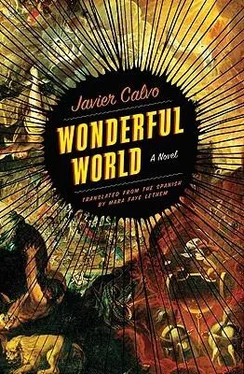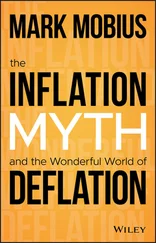“That bastard,” she says, exhaling a mouthful of smoke between two rows of gnashing teeth. “That little monster. I should have drowned him at birth. How the hell did he do it? What does he think he's trying to do?”
“He's got something.” Fonseca sits on the edge of the bathtub. “Something he thinks he can use against us. And he sent a blackmail note. Along with a page from a certain accounting ledger. It seems to be a ledger that belonged to your husband. And the note is signed by you.” He pauses, perhaps to verify the lack of expression on his main client's burn-victim face. “The note in and of itself can't hurt us. The forgery is good, but not good enough. The accounting ledger is more distressing. I can't figure out where Lucas could have found it. And that's not the worst of it.”
Fanny Giraut's private bathroom is not only much larger than many apartments in Barcelona and has three kinds of Chinese porcelain and more lines of cosmetics than many specialized stores. There are also three original prints by Mario Testino on the main wall that show models in their late teens dressed in almost invisible underwear. Fanny Giraut inhales an anxious mouthful of smoke. The way that her rage arouses a certain degree of fear isn't the way that classical goddesses aroused fear with their majestically haughty attitudes. It's closer to the way certain hybrid mythological creatures aroused fear. Women with snakes for hair. Men with a single eye. Beings with human torsos and octopus tentacles. Things with a lot of heads.
“The worst part is where he put the blackmail note.” Fonseca grabs the edge of the bathtub with both hands and shakes his head. “He put it in Koldo Cruz's mailbox. I never imagined he'd get this far.”
Fanny Giraut makes a gesture with her hand that manages to be belittling in spite of its lack of concrete elements that are belittling in and of themselves or even together. The toilet she is sitting on is one of those toilets that have some sort of soft velvety cushioning on the seat.
“The note threatened to take the ledger to the police,” says Fonseca. Seated on the edge of the bathtub. “The note that Lucas wrote pretending to be you. The ledger supposedly incriminates Cruz in some business dealings with your husband, thirty years ago. Except Cruz is in the clear, of course. The statute of limitations ran out long ago. So Cruz took it to the police.” He makes a throbbing expression of concern. “Luckily for us. He must be getting old. Or they would've just found me and you floating in the sea.”
Fanny Giraut takes a long drag on her cigarette.
“My son is ridiculous,” she says finally. “As ridiculous and idiotic as his father. Makes me want to vomit.” Her lips retract and reveal the two strips of frightfully pale and enamel-like flesh of her gums. “Just like the mental midget his father was. Like a stupid puppy showing his teeth. But he's wrong if he thinks that this is the end of this.” She is interrupted by a noise coming from the bathroom door. The click of the door handle turning fruitlessly because of the bolt on the door.
Fonseca gets up from the edge of the bathtub and smooths his clothes with the palms of his hands before approaching the door and unbolting it. On the other side of the door there's a policeman in a suit. He is wearing rubber gloves up to his elbows and is carrying some sort of toilet plunger topped with a black rubber suction cup.
CHAPTER 44. It's Only Sporting
As executive director and principal shareholder of LORENZO GIRAUT, LTD., there is no reason why Lucas Giraut shouldn't go to work each day in the private company car. Yet, because of his fondness for private moments in public spaces, Giraut prefers to walk every day to the Plaza Catalunya and take the train from there to Reina Elisenda. Every morning. The 9:16 train to Reina Elisenda. Giraut always takes a lateral seat in the first car. With one of the many professional magazines he subscribes to. Antique Trader and Art and Antiques, the local versions of Galeria Antiquaria and Arte y Coleccionismo and, of course, Antiques. The world's magazine of reference in the field. With his reading glasses and once in a while barely looking up from his magazine to scrutinize the people that come in and out of the car. Giraut likes that feeling of isolation in a crowd. One of those feelings that for some reason he finds genuinely Barcelonian.
Today Lucas Giraut leaves the former ducal palace in the Gothic Quarter at five minutes to nine and slams the metal door shut. With his attaché case with its combination lock in his right hand. It's Monday. Lucas Giraut's favorite day. The day that marks the end of the vaguely comatose desolation of Barcelona Sundays; the day when the city comes back to life. Lucas Giraut stops in the middle of the street and frowns. The black Volvo in the plaza at the end of the street isn't so much parked as it is just left in the middle of the plaza with the motor turned off. Diagonally. With its nose pointing to the church and its tail illegally pushing aside a group of Dumpsters. A muscular arm covered in powder blue and white fabric is sticking out of the driver's-side window. Loud, rhythmic music is also heard. A couple of old women observe the car from the balconies of their houses, their brows furrowed. They talk to themselves the way old people do when they are watching other people from their balconies. Like people on a muted television. The hand that is sticking out of the window drums on the car door to the beat of the music.
Lucas Giraut walks up to the car in the middle of the plaza and leans down to talk to the face that is looking at him from the driver's-side window.
“This is the third day I've seen you around here.” Giraut inspects the inside of the car as he speaks. There are remains of food and bottles on the backseat. Mixed with clothes. “I guess that means you have something you want to tell me. Your name is Saudade, right?” His gaze takes in the baseball bat with “I KILL BARÇA FANS” written on it in the passenger seat. “Does Mr. Bocanegra know that you're following me?”
Juan de la Cruz Saudade shows Lucas Giraut a wide smile filled with pieces of food in varying states of decomposition. Giraut can see that his powder blue and white Umbro sweat suit is very dirty and has various stains on the front and sleeves, as if Saudade has been wearing it for several weeks without a single trip to the Laundromat. His breath smells of carrion sprinkled with high-proof liquor.
“Mr. Bocanegra,” says Saudade, in a mocking tone that imitates both Giraut's intonations and inflections, “doesn't know everything, little rich Mr. Snotnose Booger Eater. There's a lot of stuff he doesn't know. For example, he doesn't know that you've been putting things in Mr. Pirate Patch's mailbox. I also don't think he knows that the cops have been searching your offices. And I'm not the only one following you. At this point, Farina must know everything about your little painting scam. Just imagine what would happen if Bocanegra found out. You're lucky he doesn't know. But I do know.” He pauses. He takes an open can of beer out of some invisible spot between his legs and brings it to his lips.
Giraut looks around him. The plaza at the end of his street is empty at that hour of the early morning, except for the occasional neighbor walking hastily to work. Shortly the groups of tourists with their guides will start to arrive. The patrolling police. The business owners. The unemployed bohemians. The roof of the Volvo is covered with pigeon droppings and pigeons, who are either drowsy or move in circles to the rhythm of their mating rituals.
“What do you want?” Giraut switches his attaché case from one hand to the other.
Saudade tosses the empty beer can and wipes his mouth with the sleeve of his Umbro sweat suit. The part of the sleeve that he uses to wipe his mouth already has a long beer-colored stain between the wrist and the middle of the forearm.
Читать дальше












